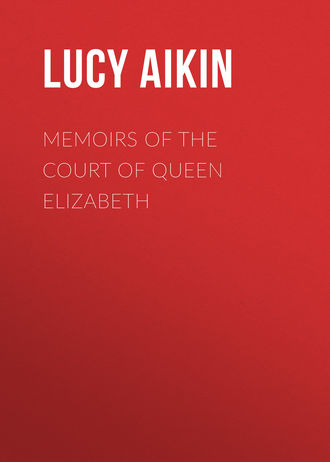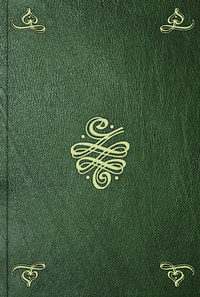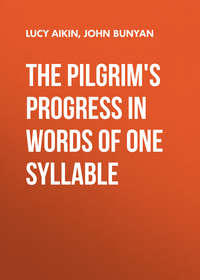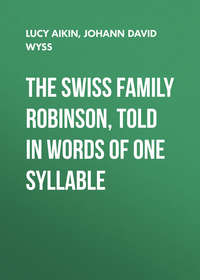 полная версия
полная версияMemoirs of the Court of Queen Elizabeth
The translation of the Orlando Furioso through which that singular work of genius had just become known to the English reader, was executed by sir John Harrington, the same who afterwards composed for Henry prince of Wales, the Brief View of the English Church, the godson of Elizabeth, and the child of her faithful servants James Harrington and Isabella Markham.
After the usual course of school and college education, young Harrington, who was born in 1561, presented himself at court, where his wit and learning soon procured him a kind of distinction, which was not however unattended with danger. A satirical piece was traced to him as its author, containing certain allusions to living characters, which gave so much offence to the courtiers, that he was threatened with the animadversions of the star-chamber; but the secret favor of Elizabeth towards a godson whom she loved and who amused her, saved him from this very serious kind of retaliation. A tale which he sometime after translated out of Ariosto proved very entertaining to the court ladies, and soon met the eyes of the queen; who in affected displeasure at certain indelicate passages, ordered him to appear no more at court—till he had translated the whole poem. The command was obeyed with alacrity; and he speedily committed his Orlando to the press, with a dedication to her majesty. Before this time our sprightly poet had found means to dissipate a considerable portion of the large estate to which he was born; and being well inclined to listen to the friendly counsels of Essex, who bade him, "lay good hold on her majesty's bounty and ask freely," he dexterously opened his case by the following lines slipped behind her cushion.
"For ever dear, for ever dreaded prince,You read a verse of mine a little since;And so pronounced each word and every letter,Your gracious reading graced my verse the better:Sith then your highness doth by gift exceedingMake what you read the better for your reading;Let my poor muse your pains thus far importune,Like as you read my verse, so—read my fortune."From your Highness' saucy Godson."Of the further progress of his suit and the various little arts of pleasing to which Harrington now applied himself, some amusing hints may be gathered out of the following extracts taken from a note-book kept by himself129.
…"I am to send good store of news from the country for her highness entertainment.... Her highness loveth merry tales."
"The queen stood up and bade me reach forth my arm to rest her thereon. O! what sweet burden to my next song. Petrarch shall eke out good matter for this business."
"The queen loveth to see me in my new frize jerkin, and saith 'tis well enough cut. I will have another made liken to it. I do remember she spit on sir Matthew's fringed cloth, and said the fool's wit was gone to rags.—Heaven spare me from such jibing!"
"I must turn my poor wits towards my suit for the lands in the north.... I must go in an early hour, be fore her highness hath special matters brought up to counsel on.—I must go before the breakfast covers are placed, and stand uncovered as her highness cometh forth her chamber; then kneel and say, God save your majesty, I crave your ear at what hour may suit for your servant to meet your blessed countenance. Thus will I gain her favor to follow to the auditory.
"Trust not a friend to do or say,In that yourself can sue or pray."The lands alluded to in the last extract, formed a large estate in the north of England, which an ancestor of Harrington had forfeited by his adherence to the house of York during the civil wars, and which he was now endeavouring to recover. This further mention of the business occurs in one of his letters.
"Yet I will adventure to give her majesty five hundred pounds in money, and some pretty jewel or garment, as you shall advise, only praying her majesty to further my suit with some of her learned counsel; which I pray you to find some proper time to move in; this some hold as a dangerous adventure, but five and twenty manors do well justify my trying it."
How notorious must have been the avarice and venality of a sovereign, before such a mode of insuring success in a law-suit could have entered into the imagination of a courtier!
But the fortunes of Harrington, as of persons of more importance, now become involved in the state of Irish affairs, to which the attention of the reader must immediately be directed.
CHAPTER XXVII
1599 TO 1603Irish affairs.—Essex appointed lord deputy.—His letter to the queen.—Letter of Markham to Harrington.—Departure of Essex and proceedings in Ireland.—His letter to the privy council,—conferences with Tyrone,—unexpected arrival at court.—Behaviour of the queen.—State of parties.—Letters of sir J. Harrington.—Further particulars respecting Essex.—His letter of submission.—Relentlessness of the queen.—Sir John Hayward's history.—Second letter of Essex.—Censure passed upon him in council.—Anecdote of the queen.—Essex liberated.—Reception of a Flemish ambassador.—Discontent of Raleigh.—Traits of the queen.—Letter of sir Robert Sidney to sir John Harrington.—Crisis of the fortune of Essex.—Conduct of lord Montjoy.—Proceedings at Essex house.—Revolt of Essex.—He defends his house.—Is taken and committed to the Tower.—His trial and that of lord Southampton.—Conduct of Bacon.—Confessions of Essex.—Behavior of the queen.—Death of Essex.—Fate of his adherents.—Reception of the Scotch ambassadors.—Interview of the queen and Sully.—Irish affairs.—Letter of sir John Harrington.—A parliament summoned.—Affair of monopolies.—Quarrel between the Jesuits and secular priests.—Conversation of the queen respecting Essex.—Letter of sir J. Harrington.—Submission of Tyrone.—Melancholy of Elizabeth.—Story of the ring.—Her death.—Additional traits of her character.—Her eulogy by bishop Hall.
The death in September 1598 of Philip II., and the succession of the feeble Philip III., under whom the Spanish monarchy advanced with accelerated steps towards its decline, had finally released the queen from all apprehensions of foreign invasion and left her at liberty to turn her whole attention to the pacification of Ireland. The state of that island was in every respect deplorable:—the whole province of Ulster in open rebellion under Tyrone;—the rest of the country only waiting for the succours from the pope and the king of Spain, which the credulous natives were still taught to expect, to join openly in the revolt; and in the meantime reduced to such a state of despair by innumerable oppressions and by the rumor of further severities meditated by the queen of England, that it seemed prepared to oppose the most obstinate resistance to every measure of government. In what manner and by whom, this wretched province should be brought back to its allegiance, had been the subject of frequent and earnest debates in the privy-council; in which Essex had vehemently reprobated the conduct of former governors in wasting time on inferior objects, instead of first undertaking the reduction of Tyrone, and appears to have spared no pains to impress the queen with an opinion of the superior justness of his own views of the subject. Elizabeth believed, and with reason, that she discovered in lord Montjoy talents not unequal to the arduous office of lord deputy at so critical a juncture; but when the greater part of her council appeared to concur in the choice, Essex insinuated a variety of objections;—that the experience of Montjoy in military matters was small;—that neither in the Low Countries nor in Bretagne, where he had served, had he attained to any principal or independent command;—that his retainers were few or none; his purse inadequately furnished for the first expenses of so high an appointment; and that he was too much addicted to a sedentary and studious life. By this artful enumeration of the deficiencies of Montjoy, he was clearly understood to intimate his own superior fitness for the office. The queen, notwithstanding certain suspicions which had been infused into her of danger in committing to Essex the command of an army, and notwithstanding the unwillingness which she still felt to deprive herself of his presence, appears to have adopted with eagerness this suggestion of her favorite;—for she held in high estimation both his talents and his good fortune. Montjoy promptly retired from a competition in which he must be unsuccessful; the adherents of the earl, except a few of the more sagacious, eagerly forwarded his appointment with imprudent eulogiums of his valor and his genius and still more imprudent anticipations of his certain and complete success. His enemies, desirous of his absence and hopeful of his failure, concurred with no less zeal in the promotion of his wishes; and he soon found himself importuned on every side to accept the command. But it now became his part to make objections;—perhaps he began to open his eyes to the difficulties to be confronted in Ireland;—perhaps he penetrated too late the designs and expectations of his adversaries at home;—perhaps, for his character was not free from artifice, he chose by a display of reluctance to enhance in the eyes of his sovereign the merit of his final acquiescence. However this might be, the difficulties which he raised kept the business for some time in suspense. Secretary Cecil observed in a letter of December 4th, 1598, that "the opinion of the earl's going to Ireland had some stop, by reason of his lordship's indisposition to it, except with some such conditions as were disagreeable to her majesty's mind;" "although," he added, "the cup will hardly pass from him in regard of his worth and fortune: but if it do, my lord Montjoy is named130."
It was in the midst of the debates and contentions on this matter that Essex endeavoured to work upon the feelings of Elizabeth by the following romantic but eloquent address.
"To the Queen.
"From a mind delighting in sorrow, from spirits wasted with passion, from a heart torn in pieces with care grief and travel, from a man that hateth himself and all things else that keep him alive, what service can your majesty expect; since any service past deserves no more than banishment and proscription to the cursedest of all islands? It is your rebels' pride and succession must give me leave to ransom myself out of this hateful prison, out of my loathed body; which, if it happeneth so, your majesty shall have no cause to mislike the fashion of my death, since the course of my life could never please you.
Happy could he finish forth his fateIn some unhaunted desert most obscureFrom all society, from love and hateOf worldly folk; then should he sleep secure.Then wake again, and yield God ever praise,Content with hips and haws and brambleberry;In contemplation passing out his days,And change of holy thoughts to make him merry.Who when he dies, his tomb may be a bush,Where harmless robin dwells with gentle thrush.""Your majesty's exiled servant"Robert Essex."It seems also to have been at this juncture that on some public occasion he bore a plain mourning shield, with the words, "Par nulla figura dolori."
A very sensible and friendly letter addressed to Harrington by his relation Robert Markham may serve to throw additional light on the situation and sentiments of Essex, and on the state of court parties.
Mr. Robert Markham to John Harrington Esquire.
"Notwithstanding the perilous state of our times, I shall not fail to give you such intelligence and advices of our matters here as may tend to your use and benefit. We have gotten good account of some matters, and as I shall find some safe conduct for bearing them to you, it may from time to time happen that I send tidings of our courtly concerns.
"Since your departure from hence, you have been spoken of, and with no ill will, both by the nobles and the queen herself. Your book is almost forgiven, and I may say forgotten; but not for its lack of wit or satire. Those whom you feared most are now bosoming themselves in the queen's grace; and though her highness signified displeasure in outward sort, yet did she like the marrow of your book. Your great enemy, sir James, did once mention the star-chamber, but your good esteem in better minds outdid his endeavours, and all is silent again. The queen is minded to take you to her favor, but she sweareth that she believes you will make epigrams and write misacmos again on her and all the court. She hath been heard to say, 'that merry poet her godson, must not come to Greenwich till he hath grown sober and leaveth the ladies' sports and frolics.' She did conceive much disquiet on being told you had aimed a shaft at Leicester; I wish you knew the author of that ill deed; I would not be in his best jerkin for a thousand marks. You yet stand well in her highness' love, and I hear you are to go to Ireland with the lieutenant Essex; if so, mark my counsel in this matter. I doubt not your valor nor your labor, but that d–e uncovered honesty will mar your fortunes. Observe the man who commandeth, and yet is commanded himself; he goeth not forth to serve the queen's realm, but to humor his own revenge. Be heedful of your bearings, speak not your mind to all you meet. I tell you I have ground for my caution: Essex hath enemies; he hath friends too. Now there are two or three of Montjoy's kindred sent out in your army; they are to report all your conduct to us at home. As you love yourself, the queen and me, discover not these matters; if I did not love you, they had never been told. High concerns deserve high attention; you are to take account of all that passes in your expedition, and keep journal thereof, unknown to any in the company; this will be expected of you; I have reasons to give for this order.
"If the lord deputy performs in the field what he hath promised in the council, all will be well; but though the queen hath granted forgiveness for his late demeanour in her presence; we know not what to think hereof. She hath, in all outward semblance, placed confidence in the man who so lately sought other treatment at her hands; we do sometime think one way, and sometime another; what betideth the lord deputy is known to him only who knoweth all; but when a man hath so many showing friends, and so many unshowing enemies, who learneth his end here below? I say, do not you meddle in any sort, nor give your jesting too freely among those you know not; obey the lord deputy in all things, but give not your opinion; it may be heard in England. Though you obey, yet seem not to advise in any one point; your obeysance may be, and must be, construed well; but your counsel may be ill thought of if any bad business follow.
"You have now a secret from one that wishes you all welfare and honor; I know there are overlookers set on you all, so God direct your discretion. Sir William Knolles is not well pleased, the queen is not well pleased, the lord deputy may be pleased now, but I sore fear what may happen hereafter. The heart of man lieth close hid oft time, men do not carry it in their hand, nor should they do so that wish to thrive in these times and in these places; I say this that your own honesty may not show itself too much, and turn to your own ill favor. Stifle your understanding as much as may be; mind your books and make your jests, but take heed who they light on. My love hath overcome almost my confidence and trust, which my truth and place demandeth. I have said too much for one in my dependent occupation, and yet too little for a friend and kinsman, who putteth himself to this hard trial for your advantage. You have difficult matters to encounter beside Tyrone and the rebels; there is little heed to be had to show of affection in state business; I find this by those I discourse with daily, and those too of the wiser sort. If my lord treasurer had lived longer, matters would go on surer. He was our great pilot, on whom all cast their eyes, and sought their safety. The queen's highness doth often speak of him in tears, and turn aside when he is discoursed of; nay, even forbiddeth any mention to be made of his name in the council. This I learn by some friends who are in good liking with my lord Buckhurst131.
"My sister beareth this to you, but doth not know what it containeth, nor would I disclose my dealings to any woman in this sort; for danger goeth abroad, and silence is the safest armour." &c.132
Such were the bodings of distant evil with which the more discerning contemplated the new and arduous enterprise in which the ambition of Essex had engaged him! In the meantime, all things conspired to delude him into a false security and to augment that presumption which formed the most dangerous defect of his character. All the obstacles which had delayed his appointment were gradually smoothed away; the queen consented to invest him with powers far more ample than had ever been conferred on a lord deputy before; all his requisitions of men and other supplies were complied with; and an army of 20,000 foot and 1,300 horse, afterwards increased to 2,000,—a far larger force than Ireland had yet beheld,—was placed at his disposal.
At parting, the tenderness of the queen revived in full force; and she dismissed him with expressions of regret and affection which, as he afterwards professed to her, had "pierced his very soul." The people followed him with acclamations and blessings; and the flower of the nobility now, as in the Cadiz expedition, attended him with alacrity as volunteers.
It was in the end of March 1599 that he embarked; and landing after a dangerous passage at Dublin, his first act was the appointment of his dear friend the earl of Southampton to the office of general of the horse;—a step which he afterwards found abundant cause to repent.
An error of which the consequences were much more pernicious to himself, and fatal to the success of his undertaking, was his abandoning his original resolution of marching immediately against Tyrone, and spending his first efforts in the suppression of a minor revolt in Munster:—an attempt in which he encountered a resistance so much more formidable than he had anticipated, and found himself so ill supported by his troops, whom the nature of the service speedily disheartened, that its results were by no means so brilliant as to strike terror into Tyrone or the other insurgents. What was still worse, almost four months were occupied in this service, and the forces returned sick, wearied, and incredibly reduced in number by various accidents.
Learning that the queen was much displeased at this expedition into Munster, Essex addressed a letter to the privy-council, in which, after affirming that he had performed his part to the best of his abilities and judgement, he thus proceeded: "But as I said, and ever must say, I provided for this service a breastplate, and not a cuirass; that is, I am armed on the breast, but not on the back. I armed myself with confidence that rebels in so unjust a quarrel could not fight so well as we could in a good. Howbeit if the rebels shall but once come to know that I am wounded on the back, not slightly, but to the heart, as I fear me they have too true and too apparent advertisement of this kind; then what will be their pride and the state's hazard, your lordships in your wisdoms may easily discern."
In a subsequent letter, the warmth of his friendship for Southampton breaks out in the following eloquent and forcible appeal.—"But to leave this, and come to that which I never looked I should have come to, I mean your lordships' letter touching the displacing of the earl of Southampton; your lordships say, that her majesty thinketh it strange, and taketh it offensively, that I should appoint him general of the horse, seeing not only her majesty denied it when I moved it, but gave an express prohibition to any such choice. Surely, my lord, it shall be far from me to contest with your lordships, much less with her majesty. Howbeit, God and my own soul are my witnesses, that I had not in this nomination any disobedient or irreverent thought; that I never moved her majesty for the placing of any officer, my commission fully enabling me to make free choice of all officers and commanders of the army. I remember, that her majesty in her privy-chamber at Richmond, I only being with her, showed a dislike of his having any office; but my answer was, that if her majesty would revoke my commission, I would cast both it and myself at her majesty's feet. But if it pleased her majesty that I should execute it, I must work with my own instruments. And from this profession and protestation I never varied; whereas if I had held myself barred from giving my lord of Southampton place and reputation some way answerable to his degree and expense, there is no one, I think, doth imagine, that I loved him so ill as to have brought him over. Therefore if her majesty punish me with her displeasure for this choice, pœna dolenda venit. And now, my lords, were now, as then it was, that I were to choose, or were there nothing in a new choice but my lord of Southampton's disgrace and my discomfort, I should easily be induced to displace him, and to part with him. But when, in obeying this command, I must discourage all my friends, who now, seeing the days of my suffering draw near, follow me afar off, and are some of them tempted to renounce me; when I must dismay the army, which already looks sadly, as pitying both me and itself in this comfortless action; when I must encourage the rebels, who doubtless will think it time to hew upon a withering tree, whose leaves they see beaten down, and the branches in part cut off; when I must disable myself for ever in the course of this service, the world now perceiving that I want either reason to judge of merit, or freedom to right it, disgraces being there heaped where, in my opinion, rewards are due; give just grief leave once to complain. O! miserable employment, and more miserable destiny of mine, that makes it impossible for me to please and serve her majesty at once! Was it treason in my lord of Southampton to marry my poor kinswoman, that neither long imprisonment, nor any punishment besides that hath been usual in like cases, can satisfy and appease? Or will no kind of punishment be fit for him, but that which punisheth, not him, but me, this army, and this poor country of Ireland? Shall I keep the country when the army breaks? Or shall the army stand when all the volunteers leave it? Or will any voluntaries stay when those that have will and cause to follow are thus handled? No, my lords, they already ask passports, and that daily." &c.
In spite of all this earnestness, in spite of the remaining affection of the queen for her favorite, she still persisted in requiring that he should displace his friend, and even chid him severely for having waited the result of his further representations and entreaties, after once learning her pleasure on the point. Success in the main object of his expedition might still have procured him a triumph over his court-enemies and a sweet reconciliation with his offended sovereign, but fortune had no such favor in store for Essex. The necessity of quelling some rebels in Leinster again impeded his march into Ulster; for which expedition he was obliged to solicit a further supply from England of two thousand foot, which was immediately forwarded to him, as if with the design of leaving him without excuse should he fail to reduce Tyrone. But by this time the season was so far advanced, and the army so sickly, that both the earl and the Irish council were of opinion that nothing effectual could be done; and at the first notice of his intended march great part of his forces deserted. He nevertheless proceeded, and in a few days during which a little skirmishing took place, came in sight of the rebel's main army, considerably more numerous than his own; Tyrone however would not venture to give him battle, but sent to request a parley. This, after some delay, the lord deputy granted; and a conference was held between them, Essex standing on the bank of a stream which separated the two hosts, while the rebel sat on his horse in the middle of the water. A truce was concluded, to be renewed from six weeks to six weeks, till terms of peace should be agreed on; those proposed by Tyrone containing several arrogant and unreasonable articles. At a second meeting with the Irish chief, Essex was attended by some of his principal officers; but it was afterwards proved that previously to the first conference, he had opened a very unwarrantable correspondence with this enemy of his queen and country, who took upon himself to promise that if Essex would come into his measures he would make him the greatest man in England. During the whole of this time, sharp letters were passing between Elizabeth and her privy-council and the earl; and it is hard to say on which side the heaviest list of grievances was produced. The queen remonstrated against his contemptuous disobedience of her orders, and the waste in frivolous enterprises of the vast supplies of men and money which she had intrusted to her deputy for a specific and momentous object;—the earl, in addition to his usual murmurings against the sinister suggestions of his enemies, amongst whom he singled out by name Raleigh and lord Cobham; found further grounds of complaint and alarm in the circumstance of her majesty's having caused some troops to be called out under the lord admiral, on pretext of fears from the Spaniard, but really with a view of protecting her against certain designs imputed to himself: and in her having granted to secretary Cecil during his absence the office of master of the wards, for which he was himself a suitor.





